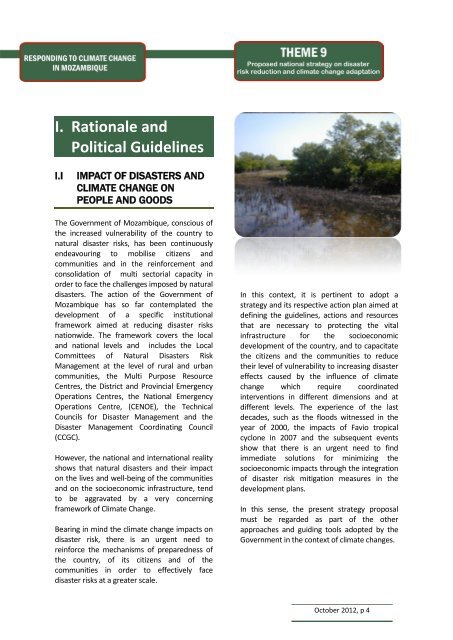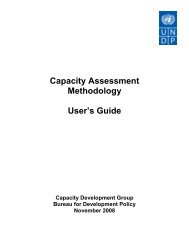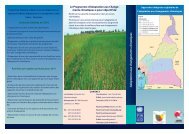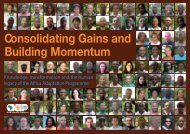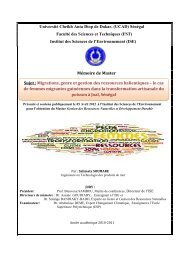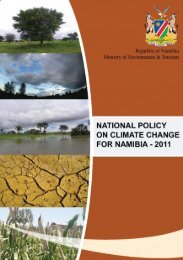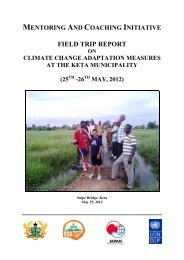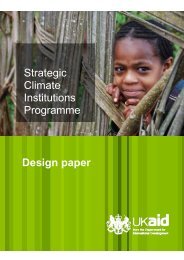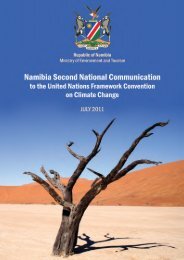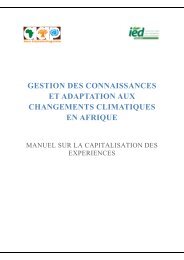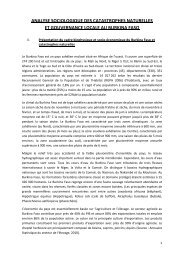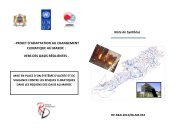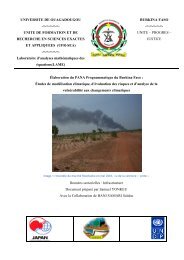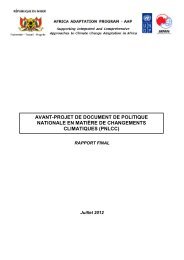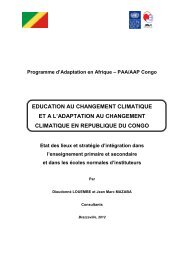Theme 9 Strategy ENG.pdf - Africa Adaptation Programme
Theme 9 Strategy ENG.pdf - Africa Adaptation Programme
Theme 9 Strategy ENG.pdf - Africa Adaptation Programme
- No tags were found...
Create successful ePaper yourself
Turn your PDF publications into a flip-book with our unique Google optimized e-Paper software.
I. Rationale andPolitical GuidelinesI.IIMPACT OF DISASTERS ANDCLIMATE CHANGE ONPEOPLE AND GOODSThe Government of Mozambique, conscious ofthe increased vulnerability of the country tonatural disaster risks, has been continuouslyendeavouring to mobilise citizens andcommunities and in the reinforcement andconsolidation of multi sectorial capacity inorder to face the challenges imposed by naturaldisasters. The action of the Government ofMozambique has so far contemplated thedevelopment of a specific institutionalframework aimed at reducing disaster risksnationwide. The framework covers the localand national levels and includes the LocalCommittees of Natural Disasters RiskManagement at the level of rural and urbancommunities, the Multi Purpose ResourceCentres, the District and Provincial EmergencyOperations Centres, the National EmergencyOperations Centre, (CENOE), the TechnicalCouncils for Disaster Management and theDisaster Management Coordinating Council(CCGC).However, the national and international realityshows that natural disasters and their impacton the lives and well-being of the communitiesand on the socioeconomic infrastructure, tendto be aggravated by a very concerningframework of Climate Change.Bearing in mind the climate change impacts ondisaster risk, there is an urgent need toreinforce the mechanisms of preparedness ofthe country, of its citizens and of thecommunities in order to effectively facedisaster risks at a greater scale.In this context, it is pertinent to adopt astrategy and its respective action plan aimed atdefining the guidelines, actions and resourcesthat are necessary to protecting the vitalinfrastructure for the socioeconomicdevelopment of the country, and to capacitatethe citizens and the communities to reducetheir level of vulnerability to increasing disastereffects caused by the influence of climatechange which require coordinatedinterventions in different dimensions and atdifferent levels. The experience of the lastdecades, such as the floods witnessed in theyear of 2000, the impacts of Favio tropicalcyclone in 2007 and the subsequent eventsshow that there is an urgent need to findimmediate solutions for minimizing thesocioeconomic impacts through the integrationof disaster risk mitigation measures in thedevelopment plans.In this sense, the present strategy proposalmust be regarded as part of the otherapproaches and guiding tools adopted by theGovernment in the context of climate changes.October 2012, p 4


